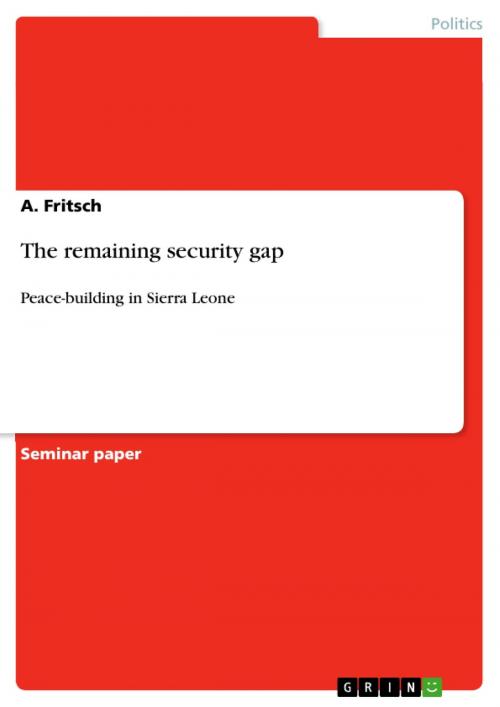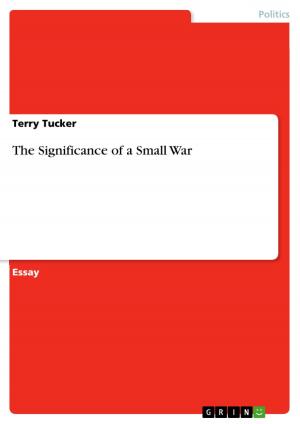The remaining security gap
Peace-building in Sierra Leone
Nonfiction, Social & Cultural Studies, Political Science, International, International Security| Author: | A. Fritsch | ISBN: | 9783638005418 |
| Publisher: | GRIN Publishing | Publication: | February 19, 2008 |
| Imprint: | GRIN Publishing | Language: | English |
| Author: | A. Fritsch |
| ISBN: | 9783638005418 |
| Publisher: | GRIN Publishing |
| Publication: | February 19, 2008 |
| Imprint: | GRIN Publishing |
| Language: | English |
Seminar paper from the year 2007 in the subject Politics - International Politics - Topic: Peace and Conflict Studies, Security, grade: 5, University of Geneva (Institut universitaire des hautes études internationales (IUHEI)), course: UN peace operations and Human Rights, 34 entries in the bibliography, language: English, abstract: As the end of the relatively clear conflict situations of the cold war era has given space for dramatic changes, we are now facing a widespread and more unpredictable security situation than some years ago. In December 2004, the UN concluded, that 'We cannot treat issues such as terrorism or civil wars or extreme poverty in isolation. The implications of this interconnectedness are profound. Our strategies must be comprehensive. Our institutions must overcome their narrow preoccupations and learn to work across issues in a concerted fashion.' The last two decades have seen a dramatic increase in internal conflicts and instability, forcing the United Nations to rethink its definitions of peace and security. Peace keeping missions, often referred as intervention according to chapter 6 ½, as Dag Hammerskjöld has put it, have gradually increased, both in number and dimension. The complexity of internal conflicts and their dramatic social, humanitarian and economic consequences for societies remain a challenge for the United Nations. Step by step, the United Nations broadened their perception, and peace operations became multidimensional interventions, including military and police components as well as NGOs and other civil actors. As almost half of the post-conflict countries relapse into violent conflict within five years, one has to question some reasons. This paper deals mainly with the interdependent issue of security within the peace-building process, focusing on the case of Sierra Leone. My thesis is, that, besides questions of the coordination of efforts and the gap between traditional peace keeping and peace-building, there is also a lack, concerning the short- to mid-term security of post-conflict states. Due to the bad economic position and the disturbed social structure of these post-conflict states and despite massive efforts in the economic and social sector as well as in the security sector, there is a certain period of insecurity until a state can ensure its stability both, internally and externally, on its own. This 'security gap' normally appears after the withdrawal of the peacekeepers. I have chosen the case of Sierra Leone as an example, because of its model like character of a complex internal conflict and the UN response. Furthermore, it demonstrates, that even if relatively concerted measures have been undertaken, the fragility of a post-conflict state, and therefore the unsolved question of a lack of security, remain.
Seminar paper from the year 2007 in the subject Politics - International Politics - Topic: Peace and Conflict Studies, Security, grade: 5, University of Geneva (Institut universitaire des hautes études internationales (IUHEI)), course: UN peace operations and Human Rights, 34 entries in the bibliography, language: English, abstract: As the end of the relatively clear conflict situations of the cold war era has given space for dramatic changes, we are now facing a widespread and more unpredictable security situation than some years ago. In December 2004, the UN concluded, that 'We cannot treat issues such as terrorism or civil wars or extreme poverty in isolation. The implications of this interconnectedness are profound. Our strategies must be comprehensive. Our institutions must overcome their narrow preoccupations and learn to work across issues in a concerted fashion.' The last two decades have seen a dramatic increase in internal conflicts and instability, forcing the United Nations to rethink its definitions of peace and security. Peace keeping missions, often referred as intervention according to chapter 6 ½, as Dag Hammerskjöld has put it, have gradually increased, both in number and dimension. The complexity of internal conflicts and their dramatic social, humanitarian and economic consequences for societies remain a challenge for the United Nations. Step by step, the United Nations broadened their perception, and peace operations became multidimensional interventions, including military and police components as well as NGOs and other civil actors. As almost half of the post-conflict countries relapse into violent conflict within five years, one has to question some reasons. This paper deals mainly with the interdependent issue of security within the peace-building process, focusing on the case of Sierra Leone. My thesis is, that, besides questions of the coordination of efforts and the gap between traditional peace keeping and peace-building, there is also a lack, concerning the short- to mid-term security of post-conflict states. Due to the bad economic position and the disturbed social structure of these post-conflict states and despite massive efforts in the economic and social sector as well as in the security sector, there is a certain period of insecurity until a state can ensure its stability both, internally and externally, on its own. This 'security gap' normally appears after the withdrawal of the peacekeepers. I have chosen the case of Sierra Leone as an example, because of its model like character of a complex internal conflict and the UN response. Furthermore, it demonstrates, that even if relatively concerted measures have been undertaken, the fragility of a post-conflict state, and therefore the unsolved question of a lack of security, remain.















